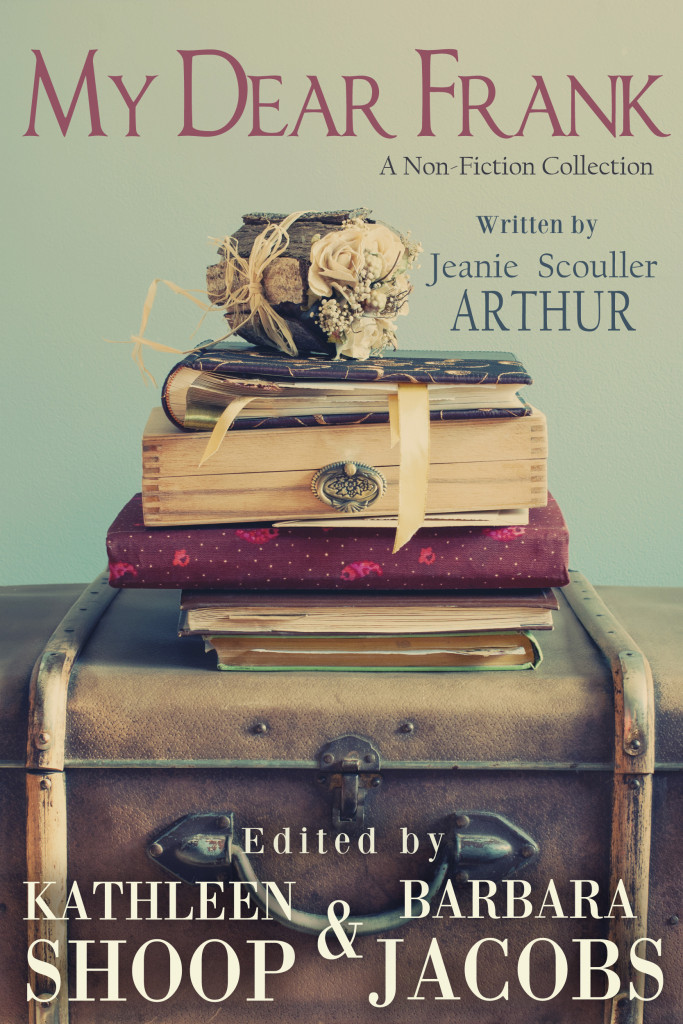
Buy the Book
After describing my great-great grandmother’s letters to me for as long as I can remember, my mother gave me the correspondence a few years back. Not only did she hand over the actual set of 45 beautifully handwritten letters, she gave me the transcript she’d painstakingly created, typing each tiny handcrafted word into a computer document I could easily read.
In addition to the familial and historical interest she thought I would take in them, she knew I was searching for my next novel idea. Like most stubborn daughters, I ignored the letters for some time. Luckily my mother knew better and kept suggesting I read them. Finally I did and after falling in love with them I gave them to my friend, Lisa, to read.
“So what happened next?” Lisa asked breathlessly, swept away by the romance of Jeanie’s letters.
“They had seven kids,” I said.
“Yeah, yeah, and then they grew old on a whitewashed porch,” she said. Her eyes were lit with the borrowed love that had fueled the letters.
I paused. Hadn’t I told her the WHOLE story? “And then they divorced.” I shrugged.
“WHAT?” Lisa grabbed my arm and prodded me for as many details as I knew. “How’s that possible?” Lisa was hooked by the great love she saw in the letters and the incredible notion that determined, strong, optimistic Jeanie could not have made her marriage work.
And in those moments I realized how remarkable Jeanie and Frank’s story was–the essence of it if not the actual facts of it. I also had over one hundred family letters including a stack written as Jeanie was dying an early death at the age of 51, a different Jeanie lived in those letters. How was it possible for a woman who was so clearly, intelligent, loving and happy as a 18-year-old woman could end up with nearly nothing as she succumbed to what was thought to be stomach cancer?
The answer is I don’t know. The exact details of Frank and Jeanie’s marital demise, in a time when divorce was dangerous, scandalous, and in some ways plain stupid for a woman to undertake, were lost with them and their children.
Luckily for me, I write fiction. And for fiction’s sake, I won’t reveal whether the novel mirrors the real Arthurs’ unraveling.
But, once it was clear I was writing this story, that the letters (or my great-grandmother’s spirit, via the letters) had nearly compelled me to do so, I set about researching, plotting and peopling my novel, The Last Letter.
I kept in mind the jaded perspective of modern readers—would they care if I wrote about infidelity and divorce? It happens every day and we see it plastered all over the media. I needed heavy reasons that Jeanie, a woman in her time and place would actually pursue divorce knowing what it might do to her family.
By the time I finished the first draft, I realized the characters names would stay as Frank and Jeanie Arthur, and their fictional counterparts would embody some of their personality traits, but that for dramatic novel purposes, that was not enough. My characters’ ages, backgrounds, characteristics both good and bad, circumstances that sent them to the prairie, number of children, and dates they had them, were constructed to fit a plot that included what is known as the Children’s Blizzard of 1888.
Aspects of the letter content, Jeanie’s language, and literary references can be seen in the novel as I could not tell this fictional story without bringing some of Jeanie’s incredible intelligence and Frank’s endless dreams into the picture.
And so, I can only hope that in telling the fictional story in The Last Letter I offer readers a glimpse into a world gone by in a way that reads as real and genuine as the people who once lived out on the prairie, struggling just to survive. And, likewise, I offer Jeanie’s letters, her writing, as a portal into the past, a real life lived hard.
Below is just one of the letters included in the book of Jeanie’s letters called My Dear Frank.
To: Mr. F. G. Arthur, East Des Moines, Polk County, Iowa.
August 6, 1882, Storm Lake, Iowa.
‘Tis Sunday again; how soon it comes. But I suppose it is because I have been so busy that it passes quickly. I have been for a long glorious horseback ride this afternoon, the first good ride I have had since I came here. I was all alone out on the prairie, almost hidden by the long grass, and I wished so much that you had been there; how we would have enjoyed ourselves.
We have no horses of our own yet and Father says he will not purchase any before spring. But I can have all the rides I want. The Englishman I mentioned in my last letter has seven horses and only uses two, he was kind enough to offer me the use of one whenever I choose to ride (by the way, Frank, he is a bachelor) and so I availed myself of the opportunity this afternoon.
I never rode so fast before it was a regular breakneck pace and it did me so much good. I ran into a nest of young chicken-hawks and got off to catch one. I succeeded but, alas! I was in the middle of a prairie a mile from the nearest house and no person to assist me in remounting. The horse too was a very tall animal, however by tying my hawk in my riding skirt and lengthening the stirrup I soon regained my lost position.
And, all my trouble was for nothing for when I got home father cut its (the hawk’s) head off. I had a letter from Mary Anne Watts yesterday of course she gave me a full budget of news but strange to say made no remarks about you but merely mentioned that you were at Taylor’s party.
According to M. A. W’s account the Sand Hill school appears to have some attractions for the young men on the north road, Myron especially. Have you taken to teaching that class of boys again, if so I wish I was one of them so I might have you to teach me. But you will teach me sometime.
I know if I only wait patiently, it is very hard, Dear, not to be able to see you sometimes. I never thought when you were with me that it would be so hard to live without you, but I know it now Frank. Still, though parted, we are together in spirit at least, and the communion of the soul is very sweet. You asked me whether I could read your letters. Yes, Dear, I can. They would be strangely written if I could not read YOUR letters. I have written mine in the same way and I hope they are legible. If not let me know and I will endeavor to write plainer.
You must not entertain such thoughts as throwing young men into the Lake upon my account. I assure you I am very little interested in any young man but one and you, I think, know who that is. I see you mentioned about that unlucky cough, but it is quite gone, and if you were here I would seal your forgiveness with a kiss, but as you are not I must send it instead. Always remember every night at eight. Do you?
I see you are very busy and working hard, but I would much rather have you than money, Frank, so be sure and take care of yourself. I am very pleased to hear that your grain is good. When I got your last letter Mother said they were coming very often, and for that reason would not last very long, but I know better than that, Darling, for I trust you implicitly.
I know that you are honorable and that what you have said, you will do. I have so much to tell you which I cannot write, but when we are together, then we can talk. Now I must say good night. Give my love to Alice and your mother hoping they are well. Dear Frank I would rather live at Des Moines than here. I don’t like it very well, but perhaps that is because you are not here.
Goodbye and accept your Jeanie’s love.
